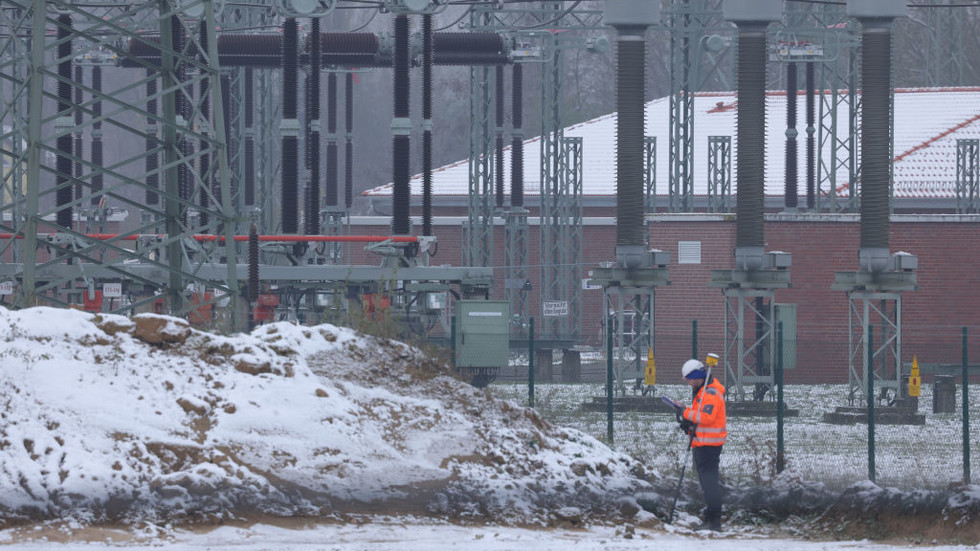Berlin’s massive energy subsidies may not be enough to cope with economic effects of the Ukraine crisis, Reuters says
Germany spending $500 billion to ‘keep the lights on’ – media
A worker stands outside an electricity substation last month on the outskirts of Berlin.
Germany has reportedly allocated nearly $500 billion to shore up its energy supplies and “keep the lights on” since the Russia-Ukraine conflict began last February, but the spending binge might not be enough to weather the crisis.
The estimated total cost reflects the “cumulative scale” of energy bailouts and other schemes that Berlin has employed amid surging oil and natural gas prices and the loss of imports from Russia, Reuters reported on Thursday.
The outlet called the various subsidies an “energy bazooka” – equating to $5,400 per resident in Germany, 12% of GDP and an estimated $1.6 billion per day since the conflict in Eastern Europe began – adding that still more spending may be needed.
“How severe the crisis will be and how long it will last greatly depends on how the energy crisis will develop,” Michael Gromling, head of macroeconomic research at the German Economic Institute, told Reuters.
The national economy as a whole is facing a huge loss of wealth.”
The economic effects of the conflict stem largely from anti-Russia sanctions imposed by the US, Germany and other NATO members. Despite Western efforts to punish and isolate Moscow, Russian government revenue from oil and gas exports has more than doubled in a year to 10 trillion rubles, about $160 billion, in 2022’s first 11 months. Over the same period, rising energy earnings helped push the government budget surplus to 557 billion rubles.
Germany resorts to record borrowingREAD MORE: Germany resorts to record borrowing
However, as Reuters noted, Europe’s biggest economy now finds itself “at the mercy” of the weather. “Energy rationing is a risk in the event of a long cold spell this winter, Germany’s first in half a century without Russian gas,” the outlet pointed out.
Stefan Kooths, vice president at Germany’s Kiel Institute for the World Economy, said uncertain energy supplies have pushed the country’s economy to a “very critical phase.” He added, “Where does the German economy stand? If we look at price inflation, it has a high fever.”
Reuters based its calculation of Germany’s spending on bailout packages for energy companies, LNG import infrastructure and funding to help utilities and traders buy gas and coal. “Despite these efforts, there is little certainty over how the country can replace Russia,” the outlet said.
https://www.rt.com/news/568329-germany-spends-500bln-on-energy-crisis/
Ghana is interested in purchasing a floating nuclear power plant from Russia, Ghanaian Ambassador to Russian Koma Steem Jehu-Appiah told Sputnik.
"I know that our minister of energy was here last year and signed a corresponding agreement. I think this is innovative, and in a conversation with the minister of energy, he said that the country is interested.
So, Ghana could purchase such a nuclear power plant," the diplomat said when asked about the possibility of Ghana purchasing a floating nuclear power plant.
Russia and Ghana began cooperation in the field of nuclear energy after signing an intergovernmental agreement in 2015.
The agreement outlined plans for joint work in the areas of training specialists, building nuclear power plants and related infrastructure, and providing maintenance services. In October 2023, representatives of Rosatom met with the Ghanaian Ministry of Energy in Cape Town. At the meeting, Russia proposed using floating nuclear power plants to supply power to ...














